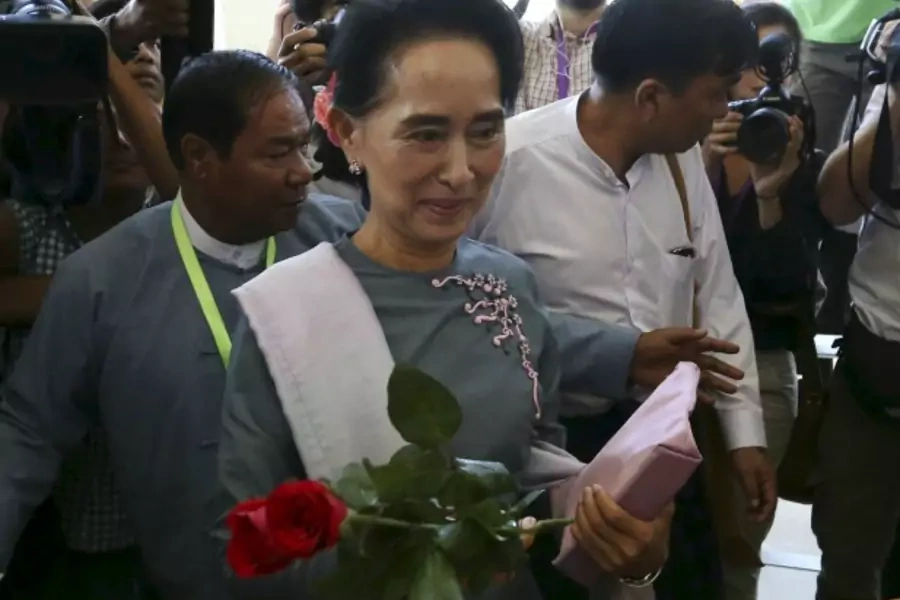More on:
Having won a decisive victory in last week’s national elections, Myanmar’s National League for Democracy (NLD), which will have an absolute majority in the next parliament, now will have to set its priorities for the next few months. The next months could be an extremely turbulent time in Myanmar, as the party proposes a compromise choice for president, the current USDP ruling party comes to terms with its massive loss, the military tries to ensure that it remains the most powerful force in the country, and the NLD negotiates with various ethnic minority leaders to ensure the next government is broadly representative of Myanmar’s people.
Aung San Suu Kyi and her advisors should focus on several priorities in the coming months. For one, they need to be in constant contact with senior military leaders, and they need to identify high-ranking, influential military leaders who could potentially protect a civilian government if, in the future, the armed forces tried to intervene in politics. Finding a trusted coterie of top military leaders is essential for a young civilian government to survive in a country with a history of coups. After the fall of Suharto, Indonesian President B.J. Habibie found generals willing to support his government; after the end of Francisco Franco’s rule in Spain, the Socialists running the democratically elected government had to rely on King Juan Carlos to find senior military leaders to turn back a coup attempt. Former Thai Prime Minister Thaksin Shinawatra thought that, in the early 2000s, he had purged the Thai army of its most politically-minded generals and surrounded himself with officers loyal to him. He was wrong: In 2006, the Thai army deposed him in a coup.
The new Myanmar government also will have to choose a president acceptable to the NLD rank-and-file, ethnic minority leaders, the military, and foreign countries. I will discuss the presidential choice in a separate post. Just as important, it will have to retain many of the capable officials and advisors who worked for the previous government, particularly on ceasefire deals with the ethnic insurgencies. Many of these advisors are former Burmese exiles who returned to the country after Thein Sein launched the reform process. Their expertise on the insurgencies and on economic policy, among other areas, will be critically needed in the next Myanmar government.
In addition, in the coming months the NLD-led government will have to formulate some kind of policy regarding the ethnic insurgent groups that have not signed the national peace deal. Already, conflict has intensified in Shan State between the Myanmar military and the Shan State Army-North. More important, the government will need a strategy for the United Wa State Army (UWSA), by far the largest holdout group. The UWSA’s relations with the previous government and the Myanmar military have been deteriorating for several years, and the UWSA are not a force to be taken lightly. As Southeast Asia security analyst Anthony Davis notes, the UWSA is the largest non- state military force in Asia, and it has under its command armored vehicles, heavy artillery, anti-tank missiles, and surface-to-air missiles. The UWSA does not want to give up its de facto statelet in northeastern Myanmar, which operates like a separate country. Yet Suu Kyi and the NLD cannot be seen as simply allowing the Wa to secede, since the idea of actual secession will infuriate the Myanmar military.
More on:
 Online Store
Online Store
